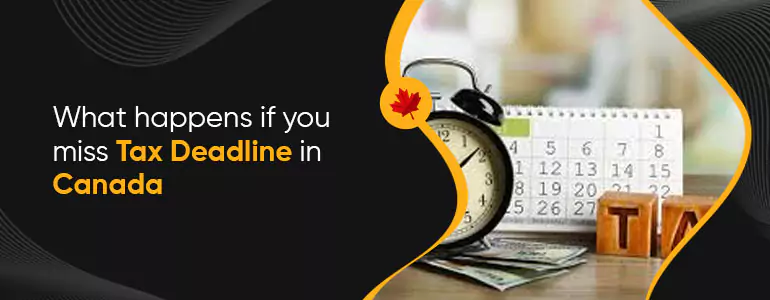The Canada tax due date for filing 2024 income tax returns was April 30, 2025. This was also the tax payment deadline. Those who missed this date may have paid the price. Filing late could have led to penalties, interest charges, and delays in benefit payments.
Staying on top of taxes helped keep government credits flowing. It also avoids stress and unexpected costs from the Canada Revenue Agency (CRA).
Tax Filing Deadline in Canada: April 30 vs June 15 for Self‑Employed
The regular Canadian tax deadline is April 30. This applies to most individuals. If you are self-employed, or your spouse is, there is a tax filing extension. You can file by June 15, 2025. However, the CRA still expects you to pay by April 30, even if you file later.
This means you must estimate what you owe and pay it on time to avoid late fees.
What If You Miss the Canada Tax Filing Deadline?

Missing the tax deadline in Canada can lead to several problems. If you owe taxes and don’t file by April 30, the CRA will charge you a penalty for late filing and interest compounded daily on the unpaid amount.
Even if you’re getting a refund, filing late can cause a refund delay. If you receive government credits like the GST/HST credit or Canada Child Benefit, those may be paused until your return is filed. For people who rely on these monthly payments, even a short delay can make things harder.
If you’ve been late in past years, the repeat offender penalty is much higher. The CRA may also take stronger actions, like CRA garnishments from your wages or placing a CRA lien on property.
CRA Late Filing Penalties: How Much Will You Pay?
If you owe taxes and file after the CRA deadline, you face a penalty for late filing. The CRA charges 5% of your unpaid amount as a starting penalty. Then, they add 1% for every full month your return is late, up to 12 months.
If the CRA already warned you to file in a past year, your penalty will double. You may face a 10% charge plus 2% per month for up to 20 months. This is called the repeat offender penalty.
Filing late gets expensive fast. It’s better to file on time, even if you can’t pay everything right away.
CRA Interest Charges on Late Tax Payments in Canada
Missing the tax payment deadline means the CRA starts charging interest compounded daily. This begins on May 1, 2025, the day after the deadline. The CRA applies interest every day until you pay in full. The rate changes every three months.
If the CRA later reassesses your return and finds you owe more, they will add more interest from the day it was due. The longer you wait, the more you owe.
Can CRA Garnish Wages or Freeze Assets If You File Late?
If you don’t file or pay, the CRA can take stronger action. The CRA may start CRA garnishments. They can take money from your wages or freeze your bank account. They can also place a CRA lien on property that you own.
These are serious consequences. The CRA doesn’t need to go to court first. If you keep avoiding your taxes, collection action can start without much warning.
Will Late Tax Filing Delay My Refund or Stop Benefits in Canada?
Filing your return late doesn’t just mean penalties. It also affects your government payments. Missing the tax deadline could result in a loss of benefits or credits.
These include:
- Canada Child Benefit
- GST/HST credit
- Old Age Security (OAS)
The CRA needs your filed return to confirm that you still qualify for these payments. If you miss the Canada tax due date, they might stop or delay your benefits.
If you’re owed a refund, filing late also causes a refund delay. You won’t get your money until your return is processed.
What to Do If You Can’t Pay Taxes on Time
Even if you can’t pay right away, file your return. This avoids the late filing penalty. If you owe money, the CRA can help set up a tax debt payment plan.
This plan lets you make smaller payments over time. The CRA may also reduce or cancel penalties or interest if you had serious personal problems, like illness or job loss. This is called taxpayer relief. You must apply, and the problem must have occurred within the last 10 years.
Avoiding your taxes is not the answer. Filing shows you are taking responsibility.
Tax Deadline for Self‑Employed in Canada: Do You Qualify for June 15?
If you or your spouse is self-employed, the self-employed filing extension gives you until June 15, 2025, to file. However, remember that your tax payment deadline is still April 30.
If your business involves tax shelter investments, you must still file by April 30. It’s important to know which rule applies to you. Filing and paying late can result in penalties and daily interest.
Filing Taxes for a Deceased Person in Canada: Deadlines and Rules
Filing for someone who has passed away follows different rules. If you’re responsible for their taxes, the CRA deadline depends on the date of death. You may get more time to file. This also applies if you are filing for their spouse.
Always check with the CRA or a tax advisor when filing for a deceased person.
Can I Still File My Taxes After the Deadline in Canada?
Even if you’ve missed the deadline, it’s not too late to file taxes after deadline. The CRA accepts late returns. It’s better to file late than not at all.
Many people delay because they feel unsure about the process. But filing gives you access to refunds and benefit payments. In 2024, the average refund was over $2,200. You won’t receive any refund until you file.
Also, if you rely on benefits like the Canada Child Benefit, your payments could stop. Filing restarts those payments.
How to File After Missing the Tax Deadline
There are several ways to file your return:
- Online Filing: Most Canadians use NETFILE-certified software. Many options are free.
- Free Tax Clinics: These help people with low incomes and simple returns.
- SimpleFile: A fast and secure CRA tool.
- Auto-fill My Return: This CRA service fills in your info using data they already have.
Make sure all the details are correct before you submit. Filing properly helps avoid future problems.
What Happens If CRA Deadline Falls on a Weekend or Holiday?
If the CRA deadline falls on a Saturday, Sunday, or public holiday, you get until the next business day. For example, if April 30 is a Sunday, your return is on time if filed by May 1.
This rule applies to both returns and payments. Still, don’t wait until the last minute. Filing early gives you time to fix mistakes and ask for help if needed.
What to Do If You Miss the Tax Filing Deadline in Canada
Missing the Canada tax due date can lead to:
- Penalty for late filing
- Interest compounded daily
- CRA garnishments
- CRA lien on property
- Refund delay
- Loss of benefits or credits
- Repeat offender penalty
Whether you’re employed or self-employed, it’s important to file and pay on time. Even if you missed the deadline, filing now can reduce the damage.
The CRA can help with a tax debt payment plan. You can also ask for relief if your situation was out of your control. But the key is to take action.
Let Bestax Handle Your Tax Filing, So You Don’t Miss a Deadline Again
Missed the tax deadline or feeling overwhelmed?
Let Bestax take care of your tax filings, so you can avoid penalties, interest, and lost benefits. Whether you’re employed, self-employed, or filing late, our team makes the process simple, accurate, and stress-free.
Stay on track. Stay compliant. Let Bestax Canada file your taxes the right way.
Quick FAQs
What happens if I miss the April 30 tax deadline in Canada?
If you miss the tax deadline and owe money, the CRA will charge you a late-filing penalty and begin adding interest the next day. You may also face delays in receiving government benefits or credits.
What penalties does CRA charge for filing late?
The standard late-filing penalty is 5% of the balance owing, plus 1% for each full month the return is late, up to 12 months. If you’ve been penalized before, this can increase to 10% plus 2% per month, up to 20 months.
Can I still file if I missed the deadline?
Yes, the CRA accepts late tax returns even after the deadline has passed. Filing late is strongly recommended to reduce further penalties and to resume any paused benefits or credits.
What interest is charged on unpaid taxes?
The CRA applies compound daily interest starting the day after your payment is due. Interest continues to build until your balance is paid in full, and the rate can change every quarter.
Does being self-employed change the deadline?
Yes, self-employed individuals and their spouses have until June 15 to file their return. However, any tax owing must still be paid by April 30 to avoid interest charges.
How do I get relief from penalties or interest?
You can submit a request to the CRA for taxpayer relief if you were unable to file or pay on time due to serious personal or financial hardship. This request must explain your situation and be made within 10 years.
What if I can’t pay the full tax amount by the deadline?
You should still file your return on time to avoid extra penalties. The CRA allows you to set up a tax debt payment plan to pay in installments.
Can CRA garnish my wages or freeze assets?
Yes, the CRA has legal authority to recover unpaid taxes through CRA garnishments or by placing a lien on your property. These actions can happen if you don’t respond to collection efforts.
Disclaimer: The information provided in this blog is for general informational purposes only. For professional assistance and advice, please contact experts.




